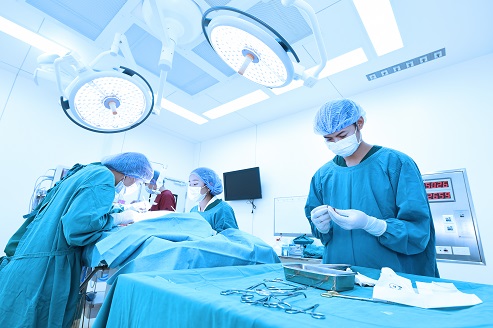 The Surgery department at Central Texas Veterinary Specialty and Emergency is here to support the incredible bond that exists between pets and owners. We offer state-of-the-art facilities, fully-equipped surgical suites and an expert staff, who remain dedicated to ensuring each patient receives only the most comprehensive and advanced surgical care available. Experts in their field, our board-certified veterinary surgeons have trained extensively in all avenues of small animal surgery and offer a wide variety of services. Our surgical teams work alongside clients, primary care veterinarians and our in-house specialty services to determine the best treatment plan for each individual patient.
The Surgery department at Central Texas Veterinary Specialty and Emergency is here to support the incredible bond that exists between pets and owners. We offer state-of-the-art facilities, fully-equipped surgical suites and an expert staff, who remain dedicated to ensuring each patient receives only the most comprehensive and advanced surgical care available. Experts in their field, our board-certified veterinary surgeons have trained extensively in all avenues of small animal surgery and offer a wide variety of services. Our surgical teams work alongside clients, primary care veterinarians and our in-house specialty services to determine the best treatment plan for each individual patient.
Services Offered
Soft Tissue Surgery
- Abdominal surgery for conditions of the spleen, liver, pancreas, gastrointestinal tract, adrenals, hernias of the abdominal wall and colorectal organs
- Cardiothoracic surgery including procedures for diseases of the heart, lungs, trachea, chest wall, diaphragm and esophagus
- Colorectal/Perianal/Perineal surgery including diseases of the anal sacs and rectum, and, perineal hernia repair
- Ear, nose, and throat surgery including surgeries for brachycephalic syndrome, tracheal collapse, laryngeal paralysis, end-stage ear canal disease (otitis externa), and ear polyps
- Endocrine surgery for diseases of the adrenal, thyroid, and parathyroid glands
- Gastrointestinal surgery for conditions of the esophagus, stomach, intestines, and colon. Common examples include foreign body removal and gastric dilatation-volvulus [GDV] correction
- Hepatobiliary surgery for diseases of the liver and gallbladder including portosystemic shunt repair, gallbladder removal/repair
- Minimally invasive surgery employing laparoscopy, thoracoscopy, cystoscopy, and tracheoscopy for common conditions such as gastropexy, bladder stone removal, and tracheal stenting
- Urogenital surgery for conditions of the kidneys, ureters, bladder and urethra, and also genital organs
Orthopedic Surgery
- Complete orthopedic examinations (diagnosis of causes of lameness and pain)
- Comprehensive treatment of cranial cruciate ligament rupture (suture-based repairs of all types, tibial plateau leveling osteotomy [TPLO]
- Arthroscopic surgery for diagnosis and repair of joint injuries and diseases including OCD lesions
- Fluoroscopic guidance for minimally invasive repair of certain types of fractures
- Fracture repair of all types using the most sophisticated techniques and implants available
- Hip dysplasia and hip osteoarthritis surgery [Total hip replacement, triple pelvic osteotomy (TPO), femoral head ostectomy (FHO), and juvenile pubic symphysiodesis (JPS)
- Joint dislocation repair
- Limb deformity corrective surgery
- Patella luxation (dislocation) correction
Oncologic Surgery
- Abdominal tumor removal
- Adrenal, thyroid and other endocrine tumor removal
- Amputation including hemi-pelvectomies
- Cytoreductive surgery for invasive tumors
- Facial reconstruction after oral tumor removal
- Feeding tube placement
- Heart and lung tumor removal
- Mammary gland tumor removal
- Perianal and rectal tumor removal
- Peripheral nerve tumors
- Skin reconstruction after tumor removal
- Spinal tumor removal
- Thoracic wall reconstruction
- Stenting for urethral and ureteral tumors
Neurologic Surgery
- Atlantoaxial instability
- Intervertebral disc disease (ruptured disc or slipped disc)
- Lumbosacral disorders
- Vertebral fractures
- Wobbler’s Syndrome
What You Can Expect
At CTVSEH, safe anesthesia for your dog or cat and continuous monitoring are a priority. We have the latest in anesthetic monitoring equipment including EKG's, end tidal CO2, oxygen saturation, and blood pressure monitors. We also feel strongly about minimizing our patients' pain before, during and after surgery. We commonly use epidurals and local anesthetics to decrease the amount of post-operative pain to allow for lower levels of anesthetic use. The majority of surgical patients are prescribed an oral medication to be given at home to help with discomfort.
In most instances, required diagnostics for your cat or dog will be performed the day of the initial consultation. Dependent on the doctors' surgery schedule and the number of emergencies, surgeries can typically be performed on the day of or the day after the initial exam. Please be prepared to leave your pet with us by bringing any medications or special diets that are currently being given.
